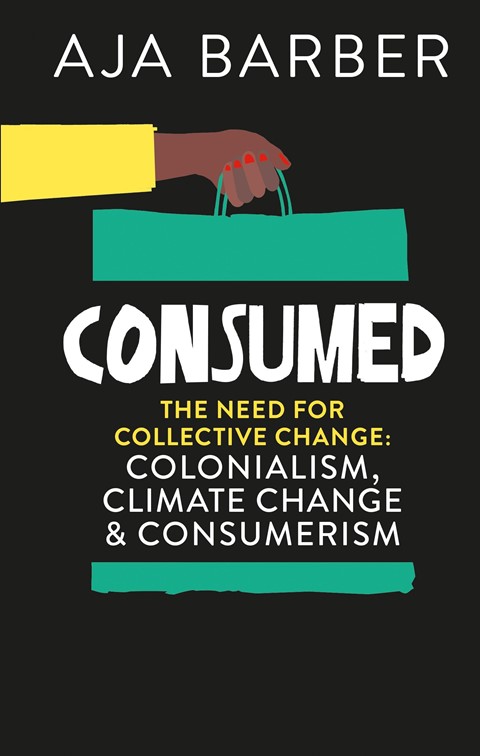Author and sustainability consultant Aja Barber talks through her book, Consumed: The need for collective change; colonialism, climate change & consumerism
Aja Barber felt like her younger self had her “nose pressed up against the glass of the fashion industry, like Charlie Bucket at the chocolate factory.” In her twenties she worked in TV to fund her fashion internships, blogging and writing on both sides of the Atlantic (Barber is originally from Virginia, USA). A move to London with her British husband meant waiting months for a visa to access paid work, so she threw herself into writing about sustainability full-time. Her outsider status propelled her current success as one of the fast fashion industry’s most intelligent and popular critics, firing off daily dispatches on Instagram and Patreon, choosing not to monetize her 243k-strong following with ads, “as no amount could buy back my integrity.”
Now she’s collected her considerable knowledge into her first book, Consumed: The need for collective change; colonialism, climate change & consumerism – a blistering polemic against our collective shopping addiction and its consequences. Rather than judging her readers, Barber begins the book by saying, “It isn’t your fault that over-consumption has become a part of our culture. The likelihood is that you do it, just like I did, because you’ve been taught to.”
She then lists evidence of the environmental damage the fashion industry wreaks; polluting rivers, wasting water, mega carbon emissions from factories and the necessary global shipping, even incinerating excess stock. She also highlights the plight of predominantly female garment workers, (monthly minimum wage is £59 in Sri Lanka and £74 in Bangladesh) who face unsafe working conditions from the likes of the Rana Plaza disaster to sexual harassment at work and union-busting by big brands.
The book vividly details waste: “Only 10-20 per cent of the clothing donated to charity shops is sold. Very often clothing which doesn’t make the cut gets shipped overseas.” One destination is Kantamanto Market in Accra, Ghana, which is “probably the world’s largest second-hand market, receiving 15 million garments a week; 40 per cent of which end up in landfill.” As a charity shop volunteer herself, Barber witnessed the “non-stop flow of clothing bags,” which triggered feelings of unease and started her journey into environmentalism.
Barber skilfully links this consumption to racism, colonialism and exploitation of non-white populations. The book explains colonialism as “when a country with power and resources dominates another country and extracts resources (both material and labour) while imposing new cultural norms,” while sharing a mindset with racism and the slave trade. She posits that, although officially colonialism like the British Empire ended before most consumers of fast fashion were born – the current global set-up of design and marketing in the rich countries of the north, and production in the global south at cut-throat prices – mirrors that of the historical definition and is just as harmful.
Over Zoom, Barber explains that assembling this theory was a gradual process. “I was looking in on [the industry] and those who were sitting front row at fashion week. I noticed that those rooms were always incredibly white, and that was blatant to me.”

Another red flag was “learning about the history of how our clothing is made, and seeing every clothing tag with ‘made in’ countries where non-white people live.”
Investigating “what happens to our unwanted clothes, and especially Kantamanto,” Barber found that “our waste is getting dumped in the global south like Ghana, Kenya and Rwanda,” and concludes that “the system really craps on non-white people at the beginning and end of the process,” crediting the organisation Slow Factory for its work educating on this topic.
From influencers of colour and even Andre Leon Talley at US Vogue receiving less pay than their white counterparts, down to the fact climate change disproportionately affects those living in non-white countries, the genius of the book is to link these varied injustices.
“None of this was an overnight realisation,” Barber says. “If you’re shocked you didn’t know all of this, that’s OK. It took me a long time to put these pieces together. But now that we understand it, what do we do next?”
The second half of the book is a practical guide to ridding yourself of the impulse to shop mindlessly, contributing to the crisis. “Not everyone feels they can move away from fast fashion for income reasons, body size or whatever, but we can all slow down.” She quotes behavioural scientist Matt Wallaert saying, “two basic needs for psychological well-being [are] to feel we’re special and unique in some way, and to feel like we fit in.” Keeping up with fashion trends is one way for people to feel that sense of belonging – and fast-fashion targets those urges. Barber promotes wearing what you have and questioning yourself when tempted. She doesn’t recommend particular brands but suggests transferring time spent scrolling, browsing, and reading marketing emails into researching fashion brands who treat their workers and the planet responsibly.
The book, although engaging, makes for heavy reading at points. Barber describes how it felt to write it: “I research and read these facts every day [which is] incredibly sobering” and, she points out, helpful at killing your urge to purchase things you may not need. “But I feel empowered knowing the facts, looking at this system and thinking about all the ways we can all be a part of reforming it.”
Consumed: The need for collective change; colonialism, climate change & consumerism by Aja Barber is published by Octopus Books, and out on 23 September.
